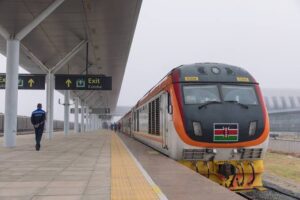
| Gichuiya Nancy |
Nairobi has witnessed a series of protests led by Gen Z activists, known for their dynamic approach to social and political issues.

These “Tuesday Gen Z Protests” have become a regular fixture in the city’s landscape, drawing attention to various causes from climate change to social justice. While these demonstrations are driven by genuine concerns, they have had significant repercussions for local businesses, leading to both immediate and long-term challenge
On protest days, Nairobi’s businesses face severe disruptions. On Tuesday Gen Z Protests led to roadblocks and traffic snarls, making it difficult for employees and customers to navigate the city. Retailers, restaurants, and service providers experience a sharp decline in foot traffic, leading to reduced sales and disrupted daily operations. The interruptions not only impact revenue but also create logistical challenges for businesses trying to maintain normal operations amidst the chaos.
The risk of property damage during these protests is a significant concern for business owners. Although Gen Z protests are generally non-violent, there are instances where tensions escalate, leading to vandalism, looting, or even arson. Businesses in affected areas face the prospect of damaged storefronts, broken windows, and destroyed inventory. The financial implications of such damage are considerable, with costs associated with repairs and replacements adding up quickly.
The unpredictability of protest schedules poses a challenge to business continuity. With no guaranteed warning or clear timeline, businesses must prepare for sudden disruptions. This unpredictability can lead to last-minute adjustments in operations, such as closing early or temporarily halting services. For many small and medium-sized enterprises (SMEs), these interruptions can be particularly damaging, as they often lack the financial cushion to absorb prolonged disruptions.
In response to the risks, Nairobi’s businesses have adopted various protective measures. One of the most common strategies is the enhancement of physical security. Business owners have invested in security personnel, reinforced their premises with physical barriers, and installed CCTV systems to monitor activities around their establishments. These measures help deter potential vandals and provide a quick response in case of emergencies.
To mitigate the impact of protests, many businesses have adjusted their operational strategies. For example, some retailers have shifted to online sales and delivery models, reducing their dependence on physical foot traffic. Restaurants and cafes may offer delivery-only services on protest days, ensuring they can continue operations while minimizing exposure to potential disruptions.
Flexible business hours have become a common response to the protests. Many businesses choose to adjust their opening and closing times based on the anticipated level of unrest. Opening later in the morning or closing earlier in the evening can help avoid peak protest times and reduce the risk of damage or disruption during high-risk periods.
Building strong relationships with the local community has proven to be an effective strategy for many businesses. By engaging with community leaders and participating in local dialogue, businesses can gain better insights into the nature and timing of upcoming protests. This engagement allows them to plan more effectively and take proactive measures to protect their assets.
In light of the frequent disruptions caused by protests, businesses are increasingly investing in comprehensive insurance policies. Insurance coverage for property damage, business interruption, and liability helps mitigate financial losses resulting from protest-related incidents. This financial protection is crucial for businesses aiming to recover quickly and resume normal operations.
The frequent protests also take a psychological toll on business owners and their staff. The constant threat of disruption and damage creates a stressful environment, affecting employee morale and productivity. Business owners must navigate not only the practical challenges of protecting their operations but also the emotional strain of managing a business in such an unstable environment.
Looking to the future, businesses in Nairobi are focusing on building long-term resilience. This includes investing in technological advancements, such as remote work tools and e-commerce platforms, to better adapt to unpredictable conditions. Additionally, businesses are advocating for improved urban planning and conflict resolution strategies to address the root causes of unrest and create a more stable environment for commerce.
The Tuesday Gen Z Protests have brought both challenges and adaptations to Nairobi’s business landscape. While the protests highlight important social issues, they also necessitate significant adjustments by business owners to safeguard their operations. Through enhanced security measures, operational flexibility, and community engagement, businesses are working to navigate these turbulent times and build a more resilient future.






